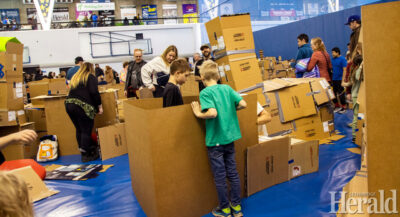Family Day events a celebration of play for young and old alike
By Lethbridge Herald on February 17, 2025.
 Families work together to build forts out of cardboard boxes on Monday during Play Day at the University of Lethbridge.
Herald photo by Alexandra Noad
Families work together to build forts out of cardboard boxes on Monday during Play Day at the University of Lethbridge.
Herald photo by Alexandra NoadAlexandra Noad – LETHBRIDGE HERALD – Local Journalism Initiative Reporter
Family Day is a holiday celebrated on the third Monday in February and many families celebrated by play-based learning at both the University of Lethbridge and the Helen Schuler Nature Centre.
The university had many activities where kids could learn about bugs while enjoying games and release some pent-up energy through play.
Sally Sage, research coordinator for Building Brains Together, which focuses on promoting play to build executive function skills in young children as well as adolescents and seniors, helped run a booth at the university.
Building Brains Together had many activities to expand their executive function skills such as Lego, a “what doesn’t belong” game, a matching game and a wordle game.
Sage says play is a term associated with children, but can be effective engage executive function skills, which is an umbrella term for cognitive flexibility, working memory and inhibitory control, which can benefit both children and adults alike.
She adds that encouraging play between parents and children helps children not only learn skills but can help strengthen their connection with each other.
“Another great aspect for this play and encouraging play between parents and their children is they can build a connection and a bond between the child and the parents and at the end at the day, the relationship between a child and the parent is going to be the most thing.”
Many adults could be found joining their kids in play at both events, whether it be a game of chess, building a fort or raising through the bouncy house obstacle course at the university or learning about water usage and dressing up at the Nature Centre.
Joel Franklin spent time with his children dressing up and playing pretend at the Nature Centre and says while he was along for the ride allowing his children to take the lead, he enjoys every bit of it.
“I’m just along for the ride at this point, they’re able to build all kinds of things, they’re able to come up with creative stories in of themselves, so my role is just to be a participant and explore with them and help them when they’re really stuck.”
Franklin adds his children have taught him a lot and have helped him connect with his inner child.
“When I became a parent, I thought I knew everything and then you realize you know less than you think,” says Franklin. “The kids end up being a very big teacher in yourself and helps remind some of the things I remember when I was a child (and) forgot as an adult.”
Esther Okeh, a volunteer at the university play event helped children understand how grasshoppers travel and move materials through having the children move materials using chopsticks.
Okeh says she has found children learn though interaction and it’s important to teach them about the world around them.
“Kids now learn through interaction and I think it’s very important to teach them young, so they can get that idea and know about the world and the environment around them.”
She adds that she noticed children having lots of fun while learning often seen having smiles and laughter while participating in the activities.
While the University held a one-day event, families can enjoy the coulees and learn about waterways at the Helen Schuler Nature Centre all week.
Jessica Deacon-Rogers, education program coordinator, says there are plenty of events both indoor and outdoor for the family to experience at the nature centre.
“We use play to have people explore the world around them, often we’re playing outside, because it’s pretty chilly in February we are playing a bit more inside for the Family Day weekend and also the week after family day.”
Deacon-Rogers adds that both children and adults can benefit from play-based learning.
Along with the exhibits at the nature centre, people can participate in a “choose your own adventure” nature trail and on Friday between one and three p.m. they will be hosting a nature play pop-up for people to enjoy some time in nature Deacon-Rogers says there is a lot of fun to be had.
“People can come down between one and three o’clock, we’ll be outside playing with a whole bunch of different objects in front of the building, so we’ll have boards and planks out, blocks, pots and pans and buckets and things like that, so people can come and play in all sorts of different ways.
Avalon Strauss, a kinesiology student who volunteered at the university’s Play Day encourages parents to get their kids out of the house and experience new things.
“I think people should start bringing their kids out and doing stuff like this more, instead of staying in and watching TV,” says Strauss. “It’ll help their brains and they can have fun with all their friends.”
26-25




